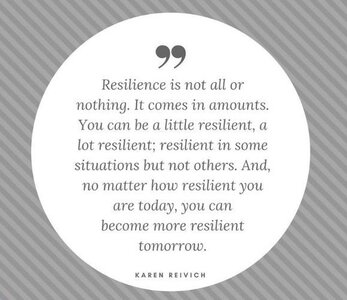- Joined
- Jun 8, 2008
- Messages
- 56,755
A person has to be resilient. People who are not resilient go the way of the dinosaur.
Truth. Be resilient and thrive or give up and wither away. Not much of a choice when you look at it like that.
A person has to be resilient. People who are not resilient go the way of the dinosaur.
I’m learning to be more and more resilient as tough situations allow me no other choice. I’m learning to choose resilience over resistance and happiness should follow. Yes, I’m happy and gratefu!
Great question, @missy!
1. ) Yes. I never forget anything bad or difficult, but learn from it and then move on and apply the new lessons in the future.
2.) Yes
I consciously take a step back from time to time and savour how lucky and happy I am : loving marriage to my soul mate, healthy and wonderful children, healthy hubby and myself, loyal friends ... The rest is gravy and we have our share: comfortable home, enough vacation, parachute pack in case of emergency. Would I like more money/bling/my size 4 back? Sure.. But then I'd have to make adjustments in other departments. So my priorites, my choice. I own it.
Easy to forget in the woes of everyday annoyances.
1. Yes, but I feel it's more about Darwinism and less about personal choice in my case.
2. I try to remain neutral. I learned mindfulness as a coping mechanism, and taking that a step further, it's best to roll with the good and bad times not rocking the boat too much either way. Kind of like a more zen approach. Day by day.
Yes and yes. Life and circumstances have made me resilient, and I definitely feel that life is good ATM and I’m happy with my lot.
I think I am resilient. Happiness is fleeting and dependent upon circumstances. I am grateful and try to see the good and the blessings I have. Sometimes that is easier than others, but I always look for it. Keeps me sane.

Spending time outdoors in nature is critical for a balanced life. Nature can help calm your mind, it’s essential for a regulated circadian rhythm, which we already learned is super important, and being among the trees offers an extra boost of oxygen for your cells. Physically, spending time outdoors can significantly improve overall health metrics. The simple act of walking in a natural setting increases physical activity, which boosts cardiovascular health and aids in muscle and bone strengthening. Moreover, the clean air and natural light of outdoor environments are fundamental for vitamin D production, which is crucial for bone health and metabolic function. On the mental side of things, natural landscapes have a unique ability to reduce mental fatigue and stress by lowering cortisol levels. This calming effect is enhanced by the sights and sounds of nature, which can be really grounding and rejuvenating for the mind. Singing birds and flowing water are so soothing that we’ve created audio tracks mimicking these nature sounds to calm us down when we’re feeling frazzled. Green spaces provide a welcome respite from urban environments, which can often feel chaotic and overwhelming. Natural settings offer a sense of space and freedom, which can promote mindfulness and presence — two things that are foundational to most spiritual health practices. After regularly spending time in nature, you might notice a better mood, improved cognitive function, improved attention, more creativity, and problem-solving ease. |
Biohackers like to measure things, so this one may seem a bit “woo-woo.” But there is no shortage of research showing that community and purpose are central to happiness and happiness is a massive contributor to health. Dan Buettner, author of Blue Zones, a book about the societies around the world that live the longest, identified social ties as one of the common features of the longest-living societies. A sense of community is powerful. It fosters a feeling of belonging and security among its members, offering a supportive network that can act as a buffer against the psychological stresses of life. When individuals feel part of a community, they are less likely to experience feelings of isolation and loneliness, which are significant risk factors for mental health issues such as anxiety and depression. Moreover, a strong community can provide emotional support during tough times, such as personal loss or health issues, reinforcing an individual's resilience by ensuring they do not face challenges alone. Research has shown that strong social ties can boost a person’s immune system, lower the risk of heart disease, and even increase your lifespan. Additionally, a sense of community plays a crucial role in personal development and empowerment. Communities can act as platforms for sharing knowledge and skills, which can lead to personal and professional growth. People often feel more empowered and motivated to achieve their potential when they know they have the understanding among others who are trying to achieve the same things. Overall, there are too many benefits of community to skip over this one. Having control over your stress and nervous system is a real superpower. |